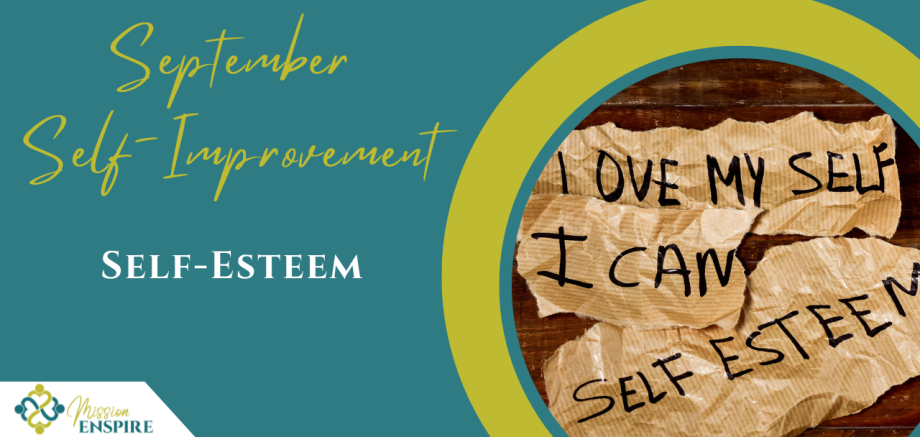As we close out the month of September, I wanted to tackle a big topic that probably many of us (including myself!) struggle with from time to time: self-esteem. In many ways, self-esteem is an important precondition for self-improvement. If we don’t have that foundation of strong self-esteem, then we risk viewing self-improvement as a chore, or seeing it as something we need to do because we aren’t already good enough. We’re more likely to just go through the motions of some self-improvement activities if we think we should, and ultimately, that self-improvement won’t be lasting or meaningful to us. Self-improvement should feel challenging (in a good way), energizing, and liberating–not because there’s a deficit in ourselves or our skills that we’re trying to fill, but because we thrive on evolving and learning new things. Positive self-esteem fuels that ongoing self-improvement journey.
We’ve probably all heard about “self-esteem” as a buzzword and gotten messages from friends, family, social media, or other sources about how important it is–and that’s certainly true. Self-esteem is paramount because it’s difficult to have good mental health if you don’t have healthy self-esteem. This means that it is every bit as important as people say. But what exactly is self-esteem? And how do you cultivate it or improve it?
While self-esteem has many components, it comes down to one thing: how you feel about yourself. Do you like yourself? Do you believe that you are worthy and valuable? Do you respect yourself and insist that others do the same? Those all contribute to healthy self-esteem (a phrasing that I tend to prefer, compared to talking about “good” vs. “bad” self-esteem, though I sometimes use those terms). The components of self-esteem include one’s sense of identity (do you know who you are?), one’s sense of purpose (why you do what you do), a feeling of belonging, feeling secure (mentally, physically, and emotionally), and feeling competent at one or more things.
Since self-esteem is so important, it makes sense to talk about its components and what causes it to rise and fall. The various components of self-esteem–identity, belonging, security, competence, and purpose–are affected by things that happen throughout life. Having a healthy amount of all five components is necessary to have good self-esteem. You cannot have a critically low level of one component and have healthy self-esteem no matter how high you score on the other components. Adverse events in childhood (bullying, trauma, detached parents or relatives, for example) are a common cause of low self-esteem. Adult-onset cases of low self-esteem can also occur due to life events such as job loss, setbacks on a career or personal goal, health crises, divorce, and so forth.
Regardless of the causes of low self-esteem, for many of us, there are things we can do to improve it. However, I also want to note that there may be times when we can’t think, read, journal, meditate, etc. our way out of low self-esteem or mental health struggles–and for those of us in that situation, it is so necessary to know that you don’t have to do it yourself. It’s OK to reach out for help from a trusted, expert health/mental health professional. (My expertise is in coaching and I’m a true believer in the power of coaching to help folks get “unstuck” or find clarity on their goals and a roadmap to achieving them. But us coaches are also trained to recognize that coaching is not therapy or mental health care and that there are some circumstances that a licensed mental health professional is best-equipped to address.)
That’s all to say–use some of the below tips to reflect and do some “DIY” self-esteem work, but also take care of yourself and seek additional professional support and help if you need it!
Recognizing Self-Esteem
Before you can learn how to raise your self-esteem, you need to first be sure that you are dealing with low self-esteem. How can you tell if someone has low self-esteem? These are the most common symptoms, but this list is by no means comprehensive.
- Self-Criticism and Denigration. Being constantly negative and self-critical is one of the surest signs of low self-esteem. It is not okay to put anyone down, and most especially not yourself. This includes all forms of denigrating oneself, including in a joking fashion.
- Thinking Other People Are Better Than You. Every person is valuable and has inherent worth just by virtue of being human. No one person is better than any other. Feeling less than or less valuable than any other person is a flashing warning sign about low self-esteem.
- Lack of Boundaries. Some folks who struggle with boundaries tend to be chronic people-pleasers. Not being able to say “no” to something you do not want to do or take on is its hallmark, whether at work or in personal affairs. This can also show up in an inability to end or set firm rules around toxic or abusive relationships.
- Focusing On The Negatives. Is everything negative? Is there no good to be found in anything? Of course not! But when you have low self-esteem, it can seem that way. Those with low self-esteem tend to focus exclusively on the negatives and cannot see anything good.
- Fear Of Failure And/Or Criticism. The fear of failing and of not being liked are tied together in those with low self-esteem. They are often afraid to do anything for fear that they will fail. Likewise, the thought of being criticized for anything can send many with low self-esteem into a panic or a spiral of shame and self-hatred.
Interrupting And Changing Negative Thought Patterns
One of the first steps to improving your self-esteem is to interrupt the patterns that help keep it low. When you have low self-esteem, many of those thought patterns are negative. You have to interrupt those patterns if you want to raise your self-esteem. Then you have to change them. The first step in this process is to begin to pay attention to those patterns. Start noticing your self-talk. That is the way you talk to yourself about yourself. Notice what sets off a pattern of negative thoughts about yourself and where those thoughts tend to go. What sends you into a shame spiral or makes you feel worthless? What are the patterns?
Next, you have to learn to interrupt those thought patterns when they start. You have to consciously stop them and go “No–this is not true,” and add something that is true. You have to do this over and over again. Sometimes you will fail, especially at first, but you just have to keep going and try again. As you work through this process, you will begin to lay down new patterns and form new connections to replace the old.
Stop Comparing Yourself To Others
It has been said that comparison is the thief of joy. Well, it also steals self-esteem. Nothing will kill your self-esteem faster than comparing yourself to another person, especially someone you feel like you are in competition with for one reason or another.
- Remember That You Do Not Know Everything. All you know about this other person is what you see on the outside. Even if it is a friend or relative, you do not know their thoughts and feelings. There are things they do not tell you. They have struggles and challenges you know nothing about. They might even be struggling with low self-esteem themselves. (I’ve often been surprised to learn that someone who–to me–seemed abundantly and effortlessly confident was in fact having the same self-doubts about themselves that I experienced myself!)
- Avoid Your Triggers. What causes you to play the comparison game? Chances are, it only occurs in certain situations and does not happen every day. Think back to the times it has happened and see if you can spot any patterns. Look for specific people and/or specific events or social functions. When you figure out what triggers it, start avoiding those situations until you have improved your self-esteem.
Practice Accepting Yourself
All people share certain things in common, but we are also all unique. Each human being is born with a combination of skills, talents, interests, personality characteristics, and so forth that have never been seen before and will never be seen again. When you have low self-esteem, it is unlikely that you accept this premise, and even if you do, you probably still do not think much of yourself as a unique person.
Start to change this narrative by making a list of your good qualities, strengths, and things that make you unique. After you have made the list, read it several times each day, for example once in the morning and again in the evening. Repeat it whenever you feel down on yourself. Work on forgiving yourself for not being perfect. No one is, but somehow you have gotten it into your mind that you should be the exception and are comparing yourself to an impossible standard. Look yourself in the eyes in a mirror and say “I’m not perfect, but no one is. I’m fine the way I am.” (It might feel a bit silly or unnatural at first, but I’ve practiced affirmations and mantras more over the past few years, and it’s surprising how powerful of an effect they can have!)
Learn to let go of the things about yourself you cannot change. You cannot change the past, or your natural talents, or certain aspects of your body or personality. Stop trying. It is just going to hurt your self-esteem even more. As you do all of these things, they will slowly come to be a part of your makeup and affect your subconscious. As time passes, you will accept yourself more and more.
I’ll be honest, this work isn’t easy! It can be difficult to heal from adverse childhood or adult experiences that affect our self-esteem. Those persistent, ingrained thought patterns are hard to disrupt. Like other aspects of self-improvement, self-esteem is a journey and building healthy self-esteem takes practice. Challenging ourselves can be good for our growth, but make sure you’re giving yourself grace and patience as well. I’ve struggled with self-esteem too, though I’m proud of the progress that I’ve made–with the support of friends, family, colleagues, coaches, and mentors–and I’ve seen how better self-esteem gives me the confidence I need to step up to my full potential in my work and in my business. What wins are you celebrating in your self-esteem and self-improvement journey?

